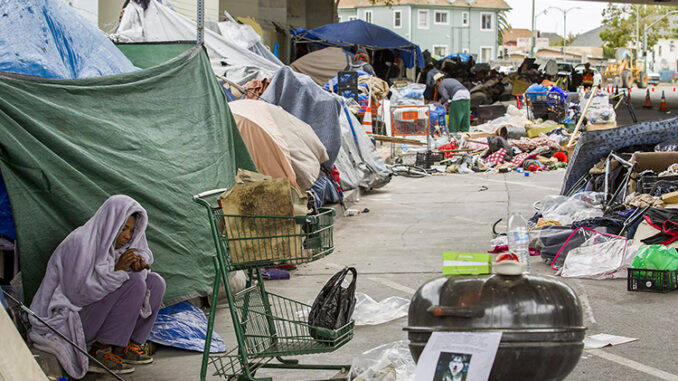
California not only has the nation’s largest number of homeless people, but one of its highest rates of homelessness vis-à-vis its overall population.
The last official count found more than 181,000 Californians without homes, nearly a third of the nation’s homeless population. When new data is released later this year, the number will probably approach 200,000.
The numbers have continued to grow despite many billions of dollars in federal, state and local funds having been spent — $20 or so billion by the state alone over the last fi ve years. As the problem worsens, it consistently ranks as one of Californians’ most pressing public policy issues, polling has found.
How is it, one might ask, that so much money could be spent with so little, if any, progress?
One factor, certainly, is that the underlying causes of homelessness, such as sky-high housing costs, family breakups, mental illness and drug addiction have not abated.
Another, probably, is that here is no consensus on what programs would be most successful and official-dom has taken a scattergun approach, providing money to a bewildering array of often overlapping programs and services in hopes of finding approaches that work.
Gov. Gavin Newsom, who pledged 20 years ago to end homelessness in San Francisco when serving as the city’s mayor, is touting a measure on the March 5 ballot that would authorize bonds to build facilities for treating the mentally ill and redirect some funds from a two-decade-old special mental health tax into new programs. He’s also won legislative approval of “CARE courts” that could compel some mentally ill Californians into receiving treatment.
The multiplicity of programs to deal with homelessness cries out for some kind of independent appraisal of what’s been spent and how eff ective the spending has been.
We may get such an overview soon because the Legislature has approved a request from Republicans for the state auditor to delve into what’s been spent.
“Homelessness is the most urgent issue facing California,” said state Sen. Roger Niello of Roseville, one of those making the request. “Given the crisis has only worsened, we need to know what the money has accomplished and what programs have been eff ective in moving people to permanent housing.”
One area the state auditor should examine is what could be termed “bang-for-the-buck” — the startlingly expensive costs of providing even the most basic services to homeless Californians.
Sacramento, like other large California cities, has a large and growing homeless population and a new report from the city auditor is indicative of that aspect of the homeless crisis.
Auditor Farishta Ahrary said the city, which faces a $66 million budget defi cit, spent $57 million on homelessness during the 2022-23 fiscal year, $34 million of it on maintaining about 1,300 beds of temporary shelter, or enough to house about a third of the city’s homeless people. Overall that’s about $26,000 per bed or $2,000-plus per month, which would equal the rent on a mid-range apartment.
Three contracts for shelters between the city and the Sacramento Housing and Redevelopment Agency amounting to more than $10 million stand out. Two 100-bed facilities cost the city almost $7 million — well over $100 per bed per day — while the third, $3.3 million for a 24-bed shelter for young people, cost the city $373 per day for each bed.
Sacramento is not alone in paying a lot of money for rudimentary shelters, and costs of that magnitude indicate that California would have to spend much more than the current levels to put roofs over the heads of its homeless people.
Meanwhile, Newsom is proposing to pare back homelessness spending because the state faces a multibillion-dollar budget deficit.



Be the first to comment